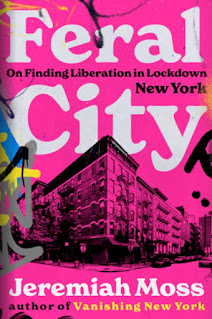Economic crisis is a blow to human narcissism--those at the extreme were enjoying the grandiose sides of their dual personalities and are now mired in their depressive sides, in which they feel worthless (leading to a spike in suicides). This may be why empathy is popping up all over.

j-No, LES Garden Heroine, VNY flickr pool
Patricia Sellers at Fortune sees a lack of empathy as the failing of Wall Street and all those "arrogant titans of industry who have stirred populist wrath," and notes that President Obama has helped bring empathy back to America.
The Times had an in-depth piece on how empathy is now being taught to privileged middle-school kids, "gossip girls and boys" raised in a narcissistic environment.
A team of neuroscientists just released news about a research paper entitled, "Can Twitter Make You Amoral? Rapid-fire Media May Confuse Your Moral Compass." In it, they look at how the quick dissemination of info bits can erode our ability to empathize. (Wired picked up this story and connected it to the MTV-style editing of TV news.) "If things are happening too fast," said one of the researchers, "you may not ever fully experience emotions about other people's psychological states and that would have implications for your morality."
And in a recent issue of The Believer, video-game journalist Heather Chaplin said, "Video games are good at fostering problem solving, but they're not so good at fostering human empathy or a deeper understanding of the human condition. Novels are about psychological empathy; games simply are not. And if games are telegraphing something about the future, maybe that tells us that psychological empathy, concern with the human condition, is not going to be that important in the twenty-first century."

Hat Shopper, VNY flickr pool
So, quite suddenly, we're concerned as a culture with our ability, or inability, to empathize with others. Is this a wave of healthy guilt following a decade of destructive greed? Maybe we are in a time of reparation. I've already written about the upside of the downturn, and this may be another aspect.
Empathy drives people with power to help the powerless--or to simply consider the people around them. In concrete terms, for this vanishing city, empathy can do wonders. It can stop a developer from bulldozing a block of homes. It might push an individual to buy prescriptions from a mom-and-pop pharmacy instead of a chain, or just remind people to keep their volume down and not disturb the neighbors. Empathy in politicians can lead to the creation of humanistic policies and urban planning.
In a society built by the human psyche, with all its attendant fears and needs, what will emerge from this shifting moment in time? Empathy may be experiencing a moment of vogue, but malignant narcissism is notoriously intractable to cure. It will be back. But, for now, perhaps, a reprieve.

Alessandro Busà, 125th St., VNY flickr pool
































